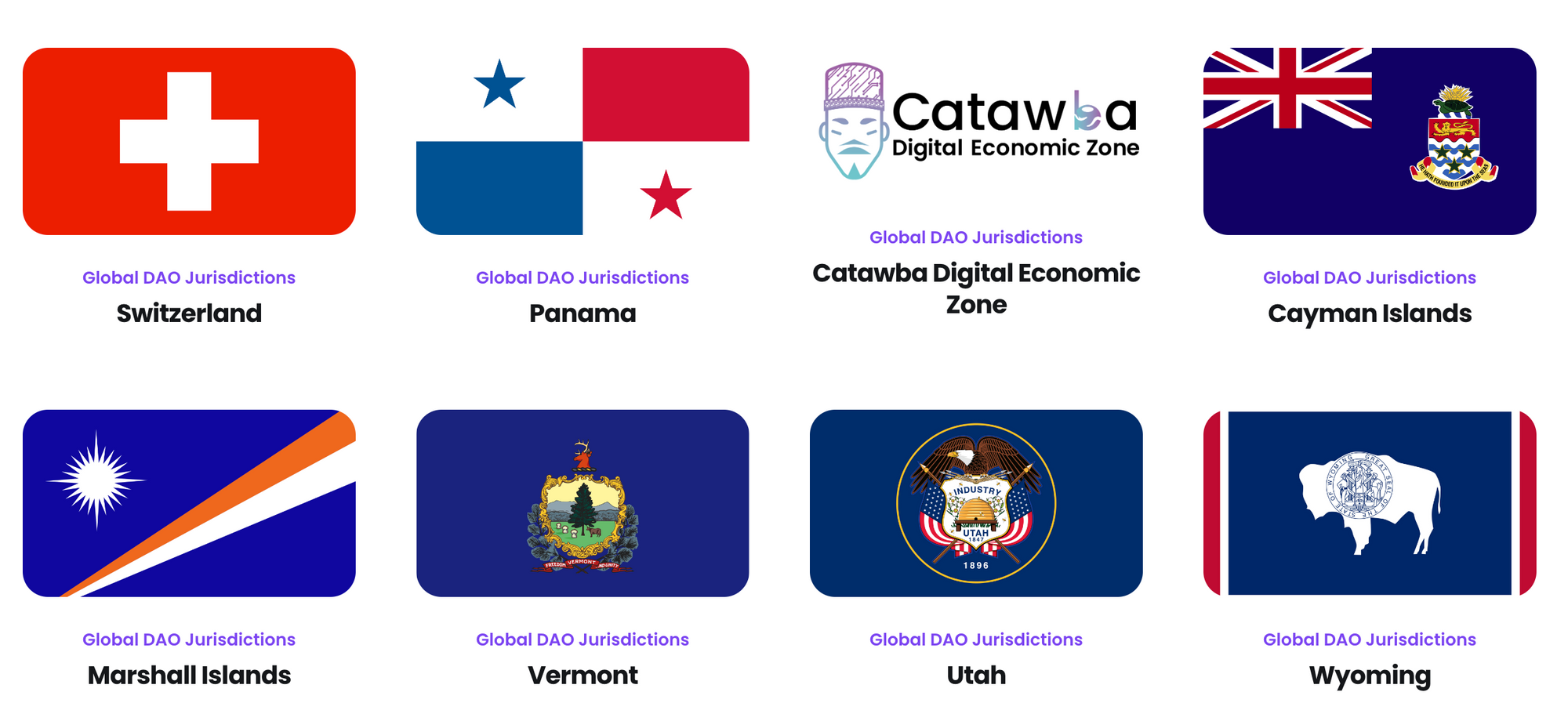What is a DAO Company? Where can you set one up?
Why set up a DAO company over a traditional company? Read our guide to the pros and cons of a DAO company.

The internet has transformed both our daily lives and the business landscape.
Three decades ago, online shopping, Google searches, and texting were unavailable.
Today, such conveniences are a norm, with emerging technologies consistently advancing, and we are moving to an internet-native economy. DAOs are one such innovation poised to alter our business financial transactions radically.
There is still no internationally agreed-upon regulatory approach to DAOs despite these benefits and many others like them. There are about 13,000 DAOs, with a combined total treasury (invested funds and liquid assets) of nearly US$ 23 billion as of May 2023.
What is a DAO?
A Decentralised Autonomous Organisation (DAO) differs from traditional companies by lacking a majority-rule leadership.
Unlike standard firms where the C-suite makes critical decisions, a DAO operates through a network of smart contracts, reducing human involvement. Thus, it enables a more egalitarian and equitable structure where all members have equal influence.
However, complete autonomy is not yet achievable due to legal constraints. DAOs present both pros and cons, to be discussed in detail shortly.
How are DAOs created?
Setting up a DAO largely mirrors the process of establishing other businesses. Legally compliant DAOs function as Limited Liability Companies (LLCs), making them separate legal entities, irrespective of their tax arrangements.
However, DAOs require additional preparatory steps. The organization's rules must be encoded before formation, and its funding mechanism must be defined in advance. Thus, this necessitates rigorous testing of the code for bugs and security flaws before launch.
Although initiated by a single individual or entity, a DAO does not confer sole control to the founder.
How does a DAO company differ from a traditional company?
Traditional companies are usually governed by owners or designated managers. A limited group generally controls the firm, making decisions via voting or board meetings.
A DAO company, however, operates without a traditional managerial hierarchy, relying on blockchain technology and smart contracts for decision-making. Thus, it allows members to engage directly in governance, eliminating the need for intermediaries and centralized authority, thereby democratizing administrative control.
What are the benefits of DAO companies?

DAOs offer notable benefits, including managerial flexibility and scope for innovation, further bolstered by the liability safeguards inherent in company formation. Factors for consideration are as follows.
1. Management flexibility
DAOs are more egalitarian and receptive to stakeholder contributions, as all members have equal voting power. Thus, influence is not restricted to those with specific connections or substantial investments, allowing for broader participation in decision-making and profit-sharing.
2. Less human error
Operating on an algorithm, a DAO company minimizes the scope for human error. Legal requirements mandate resolving any coding issues before company formation, thus reducing risk and ensuring system automation.
3. Limited liability
In a DAO company, the benefits of legal limited liability parallel those in traditional companies, offering members protection against lawsuits or other liabilities. Absent this limited liability, a DAO typically becomes a general partnership, leaving members personally liable for its actions or debts.
4. Better security of information and finances
Blockchain enhances DAOs' access to secure data and finances. All information and transactions are recorded on the blockchain, boosting security levels. Although decentralization may seem unconventional, distributing responsibilities and control enhances information security and funds. Such decentralized security facilitates both risk management and security enforcement
5. More transparency
All transactions within a DAO are securely logged on the blockchain, enabling open access to transaction records and thus offering greater transparency than traditional businesses. In a climate where consumers increasingly seek clarity, blockchain and DAO companies provide a novel framework for transparent operations.
6. Potential for more change
The nascent stage of the technology suggests that DAOs present immense opportunities to drive change and lead in bringing blockchain to mainstream consumers. Nevertheless, like any evolving technology, its applications and impact may change. By establishing a DAO company, firms can actively contribute to shaping future business models.
What are the cons of DAO companies?
Though DAO companies offer numerous benefits, this evolving business model has potential drawbacks. Factors for consideration before proceeding are as follows.
1. Need for numerous approvals
You may be aware that business partnerships often struggle with effectiveness. One reason medium and large enterprises are sluggish in adapting to market shifts is the need for approval from multiple stakeholders. DAOs can encounter similar challenges, irrespective of their size, due to the widespread involvement of members.
2. Anyone can give input on finances
Expanding on the previous point, the inclusive nature of DAOs enables individuals from diverse backgrounds to weigh in on significant financial decisions, which may not necessarily align with the organization's best interests.
3. Mistakes not tracked
Although DAOs diminish human error, they heighten the likelihood of computer-related mistakes. Operating on algorithms, errors that human scrutiny would typically catch may go unnoticed.
4. It is harder to identify security lapses
Despite blockchain and code offering robust accuracy, the organization's construction through codes implies that identifying security flaws is difficult. Such vulnerabilities may attract hackers and could be exploited before DAO stakeholders can respond.
5. Legal frameworks for DAO companies are still in their infancy
The legal infrastructure for DAOs is still largely undeveloped, although it is evolving. DAO companies provide a sturdier framework but can only be established in certain global jurisdictions. Ambiguities persist regarding accountability for costly mistakes made by a DAO. Continue reading to discover countries and states that acknowledge DAOs and what the legislation includes.
Why set up a DAO company?
The primary rationale for establishing a DAO company lies in the legal protection it affords. Creating a DAO without the formal structure of a company leaves investors and stakeholders exposed to legal liability.
Identifying liable parties within a large DAO may be complex. Still, the absence of a corporate structure makes investors and stakeholders vulnerable to legal repercussions.
In the volatile domain of blockchain technology, not forming a company around the DAO poses a significant risk. Without corporate safeguards, an investor's personal assets could be at stake in case of legal action against the DAO.
Adding to the complexity, stakeholders may be based globally. Only those in the jurisdiction where a legal case is heard would be liable, heightening the risk of a DAO lacking corporate protection.
For instance, if Americans establish a DAO with international citizens, only the American stakeholders would be liable in a lawsuit initiated in the U.S. It would be their responsibility to recover damages from global stakeholders, a task likely fraught with difficulty.
By forming a DAO company, such liabilities are confined to the DAO's assets, making corporate structure crucial for any DAO.
Where can you set up a DAO company?

Setting up a DAO company is limited (at the time of writing this article) to only a handful of DAO jurisdictions. Our team of researchers has found the following locations as DAO-friendly global jurisdictions and is always adding more.
DAO Company FAQs
Are DAOs legal?
In most states and countries, DAOs are not recognized as legal entities but are treated like partnerships. You can also establish DAOs in several countries and states, including Wyoming, Utah, Switzerland, the Cayman Islands, Panama, Vermont, and the Marshall Islands.
Are DAO companies subject to regulations and compliance?
DAO companies must meet applicable state and federal laws. For example, DAO companies formed are subject to applicable state and country laws. For example, the DAO company in Wyoming must have a registered agent and office in Wyoming.
What happens if there is a disagreement among members in a DAO company?
Typically, a DAO company sets fixed voting protocols that are challenging to amend. Members can, therefore, vote on contentious issues. Voting methods in DAOs vary, from straightforward majority rulings to more complex quadratic voting systems.
Can a DAO company own assets and enter into contracts?
Indeed, a DAO company can possess assets and engage in contracts. Establishing a company grants the DAO a legal entity capable of contractual commitments and legal redress. It also aids in reducing direct liability for DAO participants.
Can a DAO buy a company?
The capabilities of a DAO are governed by local legislation. In most jurisdictions, an unincorporated DAO would be categorized as a general partnership and lack the capacity to enter contracts or own property. Conversely, a DAO company could invest in various assets like other firms, NFTs, or tokens.
This post was published by David Bailey — a digital marketing expert and contributor to Internet Native Organization.
*Please note that the information in this post is for informational purposes only. It should not be construed as legal, tax, investment or other advice. Please do your own research before setting up a company in any jurisdiction.*
